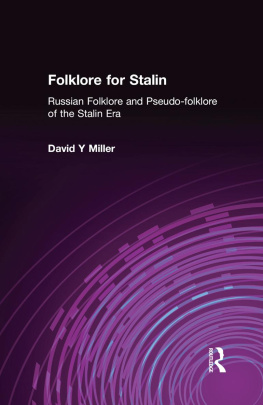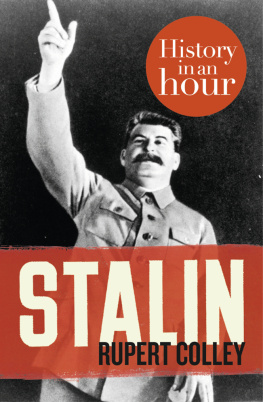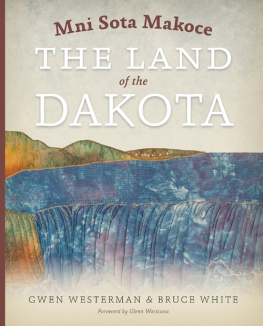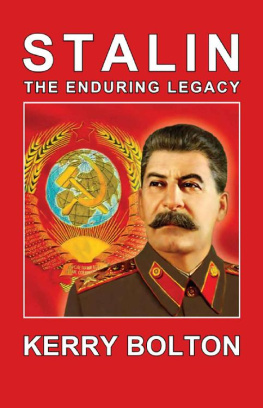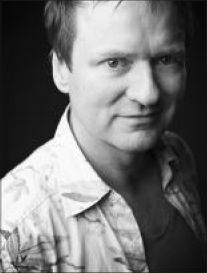Whenever I told people I was working on a book about Soviet writers, I received pitying glances. Boy meets tractor is the common designation for Soviet letters. And indeed, what excitement is there to be found in a title such as How the Steel was Tempered?
In Western reference works, the same judgement is passed again and again: the only literature of lasting value from the USSR is that which was clandestine, banned, confiscated, hand-copied, smuggled to the West or never published at all. By comparison, books bearing the nihil obstat of the Soviet censor are, with few exceptions, merely hollow and pathetic.
The Encyclopaedia Britannica roundly states that, with the publication of Gorkys collective Belomor, Soviet literature had already reached its moral nadir by 1934.
In this book I have not tried to apply any judgements based on retrospective wisdom. Instead, I have allowed myself to be carried along by the expectations and desires of the new generation of Soviet writers.
More than even the headstrong, uncompromising thinkers (Mikhail Bulgakov, Daniil Kharms, Anna Akhmatova, Joseph Brodsky), I was fascinated by the complete and partial hangers-on, the converts, the backsliders and the doubters. Perhaps because their dilemmas and weaknesses are so recognisable.
During my wanderings through the land of Soviet letters, I went to work selectively. By pausing to consider what interested me and by leaving countless details unreported, I have sketched a route of personal enthusiasms.
In order to recount the life stories of writers, scientists and other characters from within the perspective and experience of their own times, I have taken frequent recourse to reconstruction. The passages arrived at in that fashion are based on a host of sources, many of which are not noted in the main narrative.
With regard to the life of Maxim Gorky I have drawn on his autobiographical trilogy ( My Childhood, Among People, My Universities, Het Spectrum, Utrecht 1981, 1983, 1985), on Gorky: A Biography by Henri Troyat (Crown Publishers, New York 1989), on Gorky by Nina Gourfinkel (Evergreen Books, London 1960) and on A Peoples Tragedy: The Russian Revolution 18911924 by Orlando Figes (Penguin, New York 1998). A discussion was under way at the time of writing concerning the background to Gorkys return to the Soviet Union. I discovered new material and new insights in sources including the article The Great Humanist, found in the journal Novoye literaturnoye obozreniya, vol. 4, 1999.
In his book The KGBs Literary Archive (Harvill Press, London 1995), Vitali Shentalinksy the first to gain access to the KGB archives as chairman of the Commission for the Literary Heritage of Writer-Victims of the Repression had already unearthed a wealth of information about Maxim Gorky. A great deal about Babel, Pilnyak and Platonov I also found in the work of Shentalinsky, whose dogged determination between 1988 and 1992 helped him make his way into the locked files of the Lubyanka. Shentalinsky assumes that there was no personal dossier concerning Paustovsky. That is not to say that the intelligence service never collected information about him, only that he was never considered important or controversial enough to merit a dossier marked to be saved indefinitely.
There are any number of reports of Stalins meeting with some forty writers at Gorkys home. My own account was based largely on the notes taken by the literary critic Kornely Zelinsky, an eyewitness. Under the heading The Conversation of J.V. Stalin with the Writers, 26 October 1932, his notes are to be found in the Russian State Archive for Literature and Art (RGALI), folder 1604.
The original Dutch title of the survey by Johan Daisne mentioned in the book as Ten Centuries of Russian Literature is Van Nitsjevo tot Chorosjo: Tien eeuwen Russische literatuur (Electa, Brussels 1948). Daisne, whom I have referred to as chief librarian of the city of Ghent, was also a well-known poet, writer, Slavicist and film historian.
Information concerning the bay at Kara Bogaz was taken primarily from Paustovskys book Kara Bogaz (Molodaya Gvardiya, Moscow 1932). Supplementary information was found in the Soviet journal Earth Sciences (vol. 10, 1983), in the Great Soviet Encyclopedia (various editions) and in the above-mentioned thesis by Dr Amansoltan Saparova, Kara Bogaz: Scientific Research and Industrial Recovery (Turkmen Academy of Sciences, Ashgabat 1992).
Facts about the background to Platonovs novella Soul or Dzhan, were found in the encyclopedic Turkmenskaya SSR (Ashgabat 1984), and in the afterword by Thomas Langerak Over Dzhan en Andrej Platonov to the Dutch translation of Soul by J.R. Braat (Pegasus, Amsterdam 1994). In his study Andrei Platonov: Uncertainties of Spirit (Cambridge University Press, Cambridge 1992), Thomas Seifrid also deals with Dzhan. Under another title, excerpts from this novella were first published in the Literaturnaya Gazeta of 5 August 1936, and in the journal Ogonyok (vol. 15, 1947). It was only in 1964 that the entire text appeared under the title Dzhan in the magazine Prostor (vol. 9).
Certain insights into the work of Platonov I have drawn from Russische notities by Charles B. Timmer (Van Oorschot, Amsterdam 1981). The Dutch-language afterword to Happy Moscow (Meulenhoff, Amsterdam 1999) translated by Lourens Reedijk also proved helpful. The most complete overview, with all relevant entries from the writers dossier, was recently published in Moscow: Strana Filosofov: Andreya Platanova (Institut Mirovoi Literatury, Moscow 2000).
A valuable source for my description of Gorkys literary excursion to the Belomor Canal in 1933 was Making History for Stalin: The Story of the Belomor Canal by Cynthia Ruder (University Press of Florida, Miami 1998). The opinions of farmers and workers concerning literature and theatre were taken from the collection Socialist Realism Without Shores (Duke University Press, Durham, North Carolina 1997) and, more specifically, from Yevgeny Dobrenkos contribution to it.
The ornithological riddle of the 1930s, as well as the suggestion that hunting parties in the Gulag camps of Arctic Russia contributed to the decimation of Brent goose populations, comes from the Polish-German ornithologist Eugeniusz Nowak, as explained by him in the article Jagdaktivitten in der Vergangenheit und heute als Einflussfaktor auf Gnsepopulationen und andere Vgel Nordsibiriens, 1995. I would also like to thank Jan Jaap Hooft and Gerard Boere for drawing my attention to Nowaks work, and for providing their expert views on it.
Biographical and bibliographical information about Paustovsky I took from his own memoirs ( Povest o zhizni


